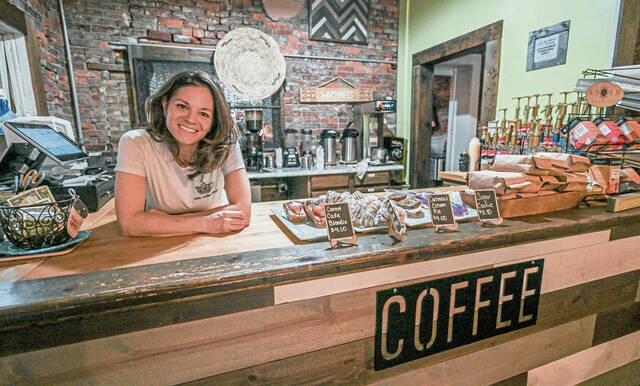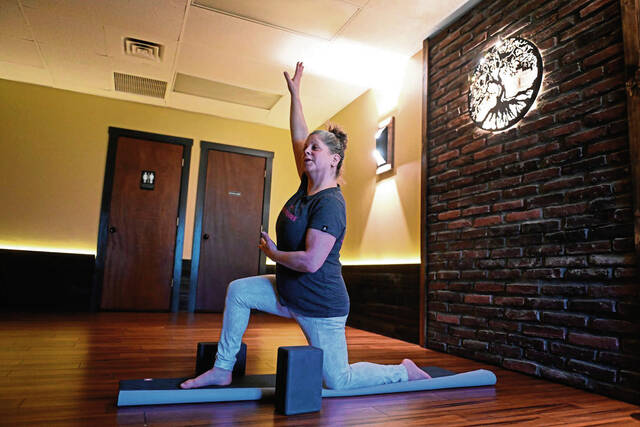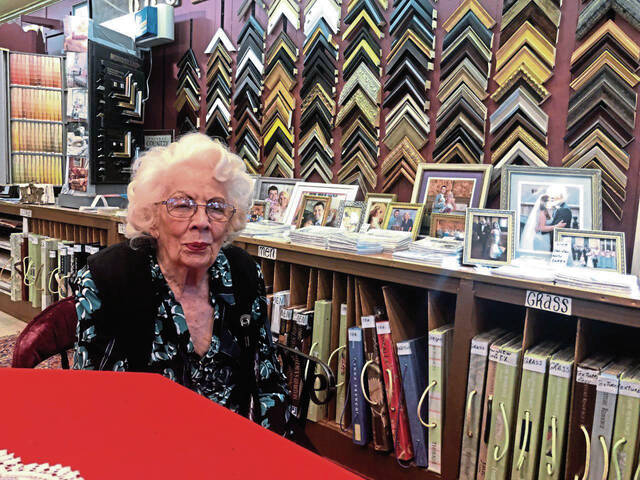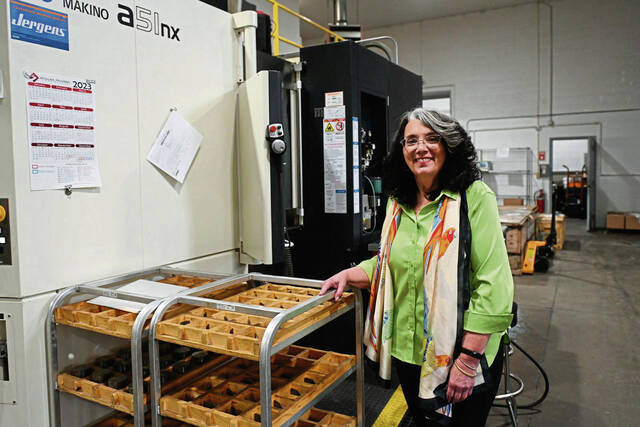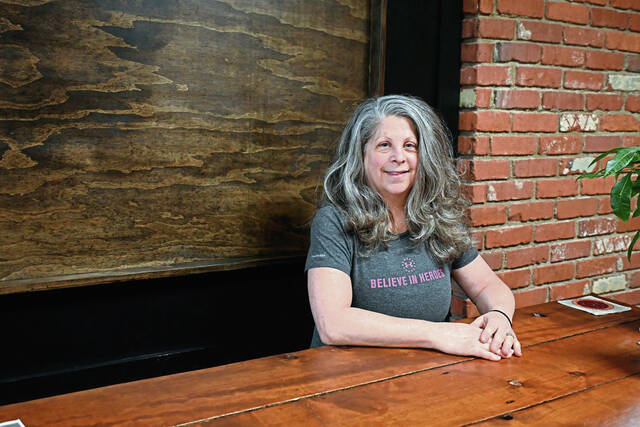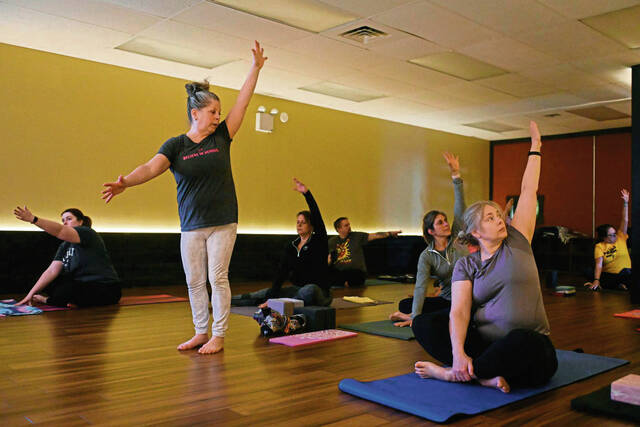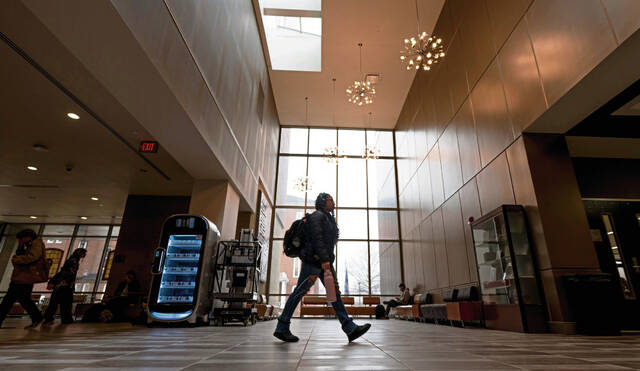Angela Merendino was a graphic designer for Kennametal in Unity, operated a freelance business on the side and was an adjunct professor at Seton Hill University in Greensburg.
She wanted something different.
“I just wanted to create a business that was steeped in health,” Merendino said.
That desire was spurred on by health issues her mother faced when she had a stroke in 2009.
“I wanted the freedom to create what I wanted to offer,” Merendino said.
So Merendino, 56, of Greensburg “took that risk” 10 years ago, opening Red Brick Yoga Inc., first at a yoga studio in Unity and now in Hempfield.
Merendino is among an estimated 13 million women who own businesses in the United States, according to the U.S. Census Bureau’s Annual Business Survey for 2020. Although women-owned firms comprise slightly less than 20% of all businesses that employed people in 2018, their numbers are growing.
Women started nearly half of all businesses in 2021, up from about 28% in pre-covid 2019, said Anne Flynn Schlicht, director of the Center for Women’s Entrepreneurship at Chatham University in Pittsburgh.
“We have seen an increase in (women ownership) in all business sectors over the last five years,” Schlicht said.
The top industries for women in business are health care and social assistance, as well as professional and technical services, administrative support and waste management, according to the National Women’s Business Council.
The center at Chatham, funded in part by the U.S. Small Business Administration, assisted 720 women with business counseling and technical assistance on ownership in the past year, Schlicht said. The center serves women in Allegheny, Beaver, Butler, Fayette, Greene, Washington and Westmoreland counties.
Part of that increase in female ownership could be attributed to the layoffs among technology companies. Women were looking for alternatives to the corporate workplace, especially when they already were working virtually because of the covid-related restrictions, Schlicht said.
“If they could work by themselves and be productive, (they wondered,) ‘Why not work for myself?’ ” Schlicht said.
Those considering owning a business might be looking for the right time, but there is likely never the “perfect time” to do it, said Nikki Saxion, who started CoCo Coffeehouse in Leechburg 12 years ago as a single mother of two young children. At the cozy cafe in the town’s business district, she serves a mix of coffee and other hot drinks with food for breakfast and lunch.
“If you are dedicated to doing it and your heart’s in it,” that is the time, Saxion said.
The time for Lois Woleslagle to open a paint and interior decorating store in Irwin, Interiors by Woleslagle, was some 53 years ago when her husband, Norman, wanted a paint store to complement his painting and wallpaper hanging business.
Woleslagle said her late husband worked with her in the store for a few days after they opened, then went back to the painting jobs he had lined up, leaving the former stay-at-home mother on her own in the shop.
“I learned from doing it. I learned from my husband, and I learned from my customers,” said Woleslagle, who at 92 is not yet ready to retire.
Her gender has had its advantages in operating the business.
“I think a lot of times women are more dedicated and women will listen better than men,” said Woleslagle, who is active in Irwin’s Business and Professional Association as its president.
Additionally, admitting you don’t know everything about the industry in which your company operates is not a weakness, said Lori Vucish Albright, CEO of Stellar Precision Components of Jeannette, which machines precision aerospace and industrial components.
“I think there is strength in admitting what you don’t know. There are a lot of resources available to help,” such as educational programs, other businesses and even customers, said Albright, who graduated with a certificate from the Owner/President Management Program at Harvard Business School in 2015.
Albright began working at her father’s machine shop shortly after graduating from Penn-Trafford High School. She helped to run the business during the day, and her brother, Michael, would help after his school day was finished. Then her father, Mike Vucish Sr., would join them after he was done at his teaching job at a vocational-technical school.
“I watched his dedication and willingness to grind it out. He had a strong work ethic,” Albright said of her father, who retired in 2004.
Challenges
Regardless of dedication, starting a business is not for the faint of heart. About 50% of new businesses don’t last past their first year and 50% of those that do survive don’t get to mark their fifth anniversary, according to the U.S. Bureau of Labor Statistics.
The challenge for many, regardless of gender, is getting access to capital.
In some cases, “women don’t have the collateral to secure the funding,” Schlicht said. Furthermore, when they are starting a business and seeking funding, “they have no track record (of business success)” to prove to lenders they can succeed, she said.
Those who do start their own business find it can give them more flexibility in handling family issues, Schlicht said. That was especially beneficial during the covid-related restrictions. In some cases, women were juggling the responsibilities of taking care of their children and elderly parents at the same time, Schlicht said.
Albright said in her case, her husband, Michael, shifted his focus to helping raise their five children when the pharmaceutical company for which he sold products was downsizing. Still, Albright remembers there were days when the children came into work with her at the machine shop.
Being your own boss and gaining a sense of self-fulfillment has its advantages, Schlicht said, but working fewer hours than one did for a corporation is not one of them.
“You work more hours, but (owners) know they control those hours,” she said.
Work ethic one key
Saxion, a North Apollo native, was familiar with the long hours in the restaurant business, having worked for her uncle’s Italian restaurants.
“I knew I had the work ethic” to do it, Saxion said.
Rather than having one area of responsibility within a corporation, ownership means more responsibilities.
Merendino, for instance, said she wears “a lot of hats” in running the yoga studio. But, she said, “women are accustomed to wearing a lot of hats.”
Saxion knows all about multiple responsibilities. She opened her cafe when when her youngest child was just 18 months old. He sometimes would spend time with her in the kitchen, she recalled.
“It meant balancing the family (needs) and trying to stay relevant (with the business),” she said.
In 2017, Saxion expanded with CoCo Coffeehut, a drive-thru “coffee shop” in Leechburg. Saxion found she was well-positioned with the drive-thru when pandemic restrictions shut down restaurants in March 2020. She opened a CoCo’s in Ford City last fall.
“You have to be willing to adapt to change to what people want,” Saxion said.
For those women contemplating starting a business, these women offered encouragement.
“I would say don’t be afraid to go for it,” Merendino said. “Do what you love and are passionate about.”
“You can be successful,” Albright said, “if you are willing to work for it.”


